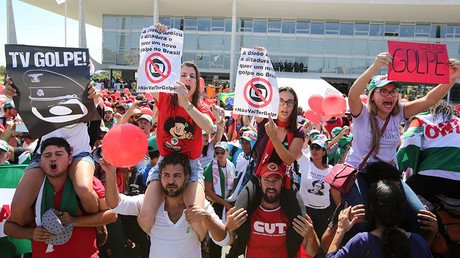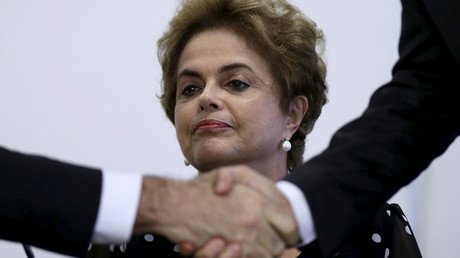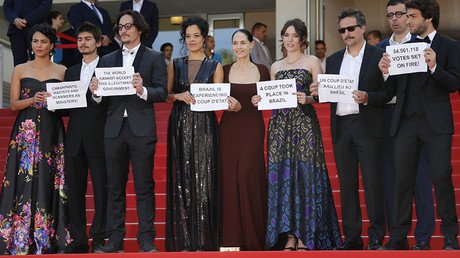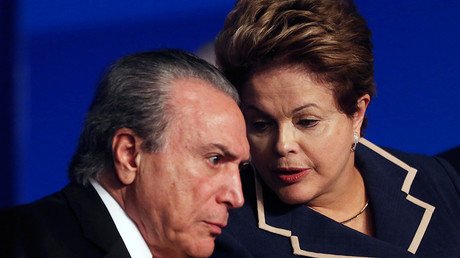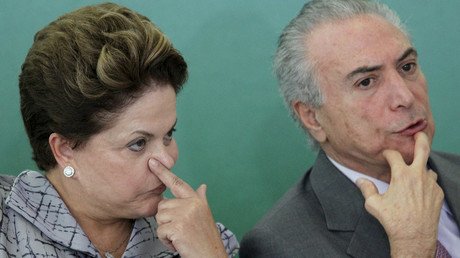Dilma Rousseff: Old Brazilian oligarchy behind ‘coup’ (FULL INTERVIEW)
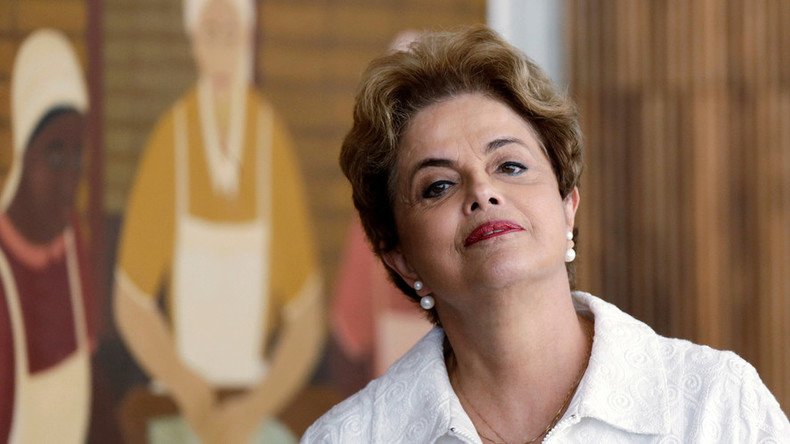
Unseated Brazilian President Dilma Rousseff has spoken to RT in her first TV interview since being suspended from office by the country’s Senate. She says that the old Brazilian oligarchy is behind the impeachment process, and vows to fight the “coup.”
RT: Hello and welcome to The Interview. Today we undoubtedly have a very special program, as we have the great honor to interview the President of Brazil, Madam Dilma Rousseff. She’s going through a difficult time now, and it’s a difficult time for Brazil as well. Madam President, thank you very much. I’d like to thank you for your time and for the trust you have in RT – thank you so much.
Dilma Rousseff: Thank you for giving me this opportunity to address the Russian people.
RT: Before we start talking exclusively about political issues, my first question, if I may, is more personal. Currently you’re staying at the Alvorada Palace, in exile of sorts in your own county. How do you feel about that? I’m asking because many Brazilians are asking me this question in the streets. They want to know how you feel and whether you feel strong enough at this difficult hour.
DR: I’m fairly optimistic. I keep fighting not only to remain President, but also – and first and foremost – for the democratic rights in my country. To tell you the truth, I don’t intend to stay cooped up in my official residence, the Alvorada Palace. I want to go to many Brazilian cities and meet many people. This way I can tell Brazil, and maybe even the entire world, about what’s really going on in the country and how we intend to counter what we believe is a coup attempt.
RT: Speaking of the impeachment, the coup and the trial, I’d like to ask you – is this basically a soft coup, without weapons and violence? Moreover, to which extent do you think this coup is aimed against you, and to which extent not only against Brazil, but against its allies, say, the BRICS countries?
DR: I think it’s an impeachment process, to remove me from the office. Our Constitution provides for an impeachment, but only if the President commits a crime against the Constitution and human rights. We believe that it’s a coup, because no such crime has been committed. They put me on trial for additional loans [from state banks]. Every president before me has done it, and it has never been a crime. It won’t become a crime now. There is no basis for considering it a crime. A crime has to be legally defined. So we believe this impeachment is a coup, because it’s clearly stated in the Constitution that only a crime of malversation can serve as basis for impeachment. The actions currently under scrutiny do not, strictly speaking, fall under that category. Besides, Brazil is a presidential republic. You can’t remove a president or a prime minister who hasn’t committed a crime. We’re not a parliamentary republic, where a president can dissolve the congress, which, in turn, can call for a vote of no confidence out of purely political reasons. So it’s impossible to impeach a president in Brazil based solely on political reasons or political distrust. We believe that what’s happening now in Brazil is an attempt to replace an innocent president involved in no corruption-related legal proceedings in order for the politicians that lost the 2014 election to control the state bypassing the new election. That’s what’s happening. This is an attempt to replace the entire political program that includes both the social and economic development aspects and is aimed at tackling the crisis that Brazil has been going through in recent years with a program clearly neoliberal in nature. This program provides for minimizing our social programs in accordance with the minimal state doctrine. This doctrine is at odds with all the Brazilian legal norms regarding healthcare, construction and ensuring that our people have their own houses, availability of high-quality education and minimum wages guaranteed to the poorest part of the Brazilian population. They want to do away with these rights and at the same time they conduct an anti-national policy, for example, when it comes to Brazil’s oil resources. Significant subsalt oil reserves, lying 7,000 m below the surface, were discovered recently. The ministers were saying that exploring these reserves was impossible, but now we’re extracting a million barrels daily from subsalt oil reserves. Undoubtedly, they were saying that thinking to change the legislation in order to guarantee access to these reserves to international companies. Moreover, in terms of foreign policy, starting from Lula da Silva and throughout my presidency, we have been seeking to strengthen ties with Latin American, African, BRICS countries and other developing nations, in addition to the developed world – the US and Europe. I think that BRICS is one of the most important multilateral groups created in the last decade. But the interim government holds different views on BRICS and the importance we place on Latin America. They are even discussing the possibility of closing embassies in some African countries. We have very special relations with Africa. Brazil is the country with the highest percentage of population of African descent in the world, second only to African countries. We have a lot of people of African descent, so over the last few years we’ve been putting particular emphasis on our relations with the African countries, and not only Portuguese-speaking ones. This shows a wider approach to the world, as opposed to the traditional one, supported by those who have usurped the power now and are taking steps that are at odds with the program approved by the Brazilian people, by 54 mln votes, on the day I was elected.
RT: You’ve touched upon a number of subjects. Let’s go back to some of them later, in particular the social programs and the polyethnicity, which are handled differently by the interim government. Let’s talk about that later, but now, if I may, let’s discuss in more detail how what’s happening in Brazil is affecting the entire continent. We’ve heard what many leaders think about it, for example, Ecuadorian President Rafael Correa referred to it as the second Operation Condor. Do you think that’s true? Are there external powers seeking to shift the political balance in Latin America?
DR: It could be an attempt to change the political landscape in Latin America, taking into consideration the important role that Brazil plays in the region. But I’d like to point out one thing – this process is taking place inside Brazil and is controlled by Brazilian forces whose interests obviously lie inside Brazil. Current events can’t be ascribed to some external interference. That would be wrong, since that’s not what’s happening. But of course, we’re talking about such a key player in the regional and international political arena as Brazil, and when in a country like that different political forces come to power it could benefit a number of players.
RT: You’ve said that before, but recently there’ve been reports, for example, from WikiLeaks, that in 2006, when Mr da Silva served as president, current interim president Michel Temer had contacts with the US Embassy in Brazil. This figure would be beneficial to the interests of Washington and large banks. He was vice president in your government. First of all I’d like to ask you – was it noticeable that Temer had such interests? And what changes should we expect from someone like him being in power?
DR: No, Vice President Temer showed no sign of it. Yes, according to WikiLeaks he did have such contacts. I don’t think that it was politically appropriate, it’s wrong to have such contacts with representatives of foreign countries. But I’ll say again that I don’t believe external interference is a primary or a secondary reason for what’s happening now in Brazil. It’s not. The grave situation we see now has developed without any such interference. This coup is not like usual coups in Latin America, which normally involve weapons, tanks in the streets, arrests and torture. The current coup is happening within the democratic framework, with the use of existing institutions in support of indirect elections not stipulated in the Constitution. This coup is carried out by hands tearing apart the Brazilian Constitution. So we don’t know what kind of repercussions this will lead to, considering that an impeachment without repercussions would only be possible in the case of a committed crime. If there is no crime, an impeachment is illegal. And since it’s illegal, it’s a serious problem for the interim government. I’m living proof of this unlawfulness and injustice. It also means that they can’t forget about it; they staged a coup and they can be called usurpers, which is a very strong word in the political sphere.
RT: Speaking of Brazil’s political problems, we’ve already mentioned Michel Temer’s government, and we’ll go back to that later. But here’s what I want to ask you. This is an interim government led by an interim president supported by mere 2% of the population. There is information that could launch an impeachment process against him. His cabinet consists exclusively of white males, and that’s in a polyethnic country. Some ministers are being investigated on charges of corruption. How legitimate is such a government?
DR: The legitimacy is not there because of the original sin (sic), by which I mean the process resulting from blackmail. The very same President of the Chamber of Deputies that launched the process is accused of having accounts abroad, corruption and money-laundering. This process bares the sores of Brazilian democracy and leads to dismantling the government structure that we had. I didn’t appoint him vice president or head of the interim government so that he could create a government made up exclusively of white people, with no women or people of African descent in it. A government that would disregard one of the most important institutions that serves as the foundation of the Brazilian identity – the Ministry of Culture. Culture has a direct bearing on the national issue. In a country such as ours, with such ethnic variety, culture is a unifying factor that allows everyone to express themselves within that variety, which is why what’s going on now is so regrettable. It’s not only about the loss of civil rights and liberties, but I would even say it’s a violation of the national issue due to the decreasing role of the ministry. Another interesting thing about this government is that today they’re adopting a measure, and tomorrow they’re changing it – they haven’t been elected, so they don’t have a legitimate program. They haven’t presented it during the election campaign and they haven’t participated in debates about it. This program hasn’t been approved by the population. So the government makes absurd statements. For example, they say that we need to get rid of some parts of the Brazilian healthcare system. In accordance with the 1988 Constitution, the system guarantees free and universal healthcare. The interim government wants to shrink the system and make some healthcare services the competency of private firms. The government is creating these controversies to see how the people will react, and a day later they change their stance, but they’re bad at concealing the tendency – their purpose, really – to implement the most neoliberal program possible.
RT: Are you saying that they’re trying to feel the population’s pulse, so to speak?
DR: Their actions include an aspect that I would call a mix of inability to govern and feeling the pulse. Both those things are present.
RT: Do you feel proud of the Brazilian people? You spoke about the Brazilian culture, about the demonstrations in major cities that sent a clear message to the government that Brazilian culture is not to be touched? At the Cannes film festival, too, the filmmakers reinforced the same message.
DR: That’s the most important thing, the spontaneous demonstrations of the ordinary people, of artists, of those who do it anonymously, who feel dissatisfied with what happened. I’m talking not only about my mandate, but this experiment on democracy, this loss of rights. I was very touched by the demonstration in Cannes staged by our director who made Aquarius, and other demonstrations. Recently a theatre in one Brazilian town had a Carmina Burana performance with a political message that condemned the interim usurper government.
RT: There are some reports indicating that the interim government might revoke 75 of your bills and the Workers' Party amendments made to the legislation in the course of the last 13 years. I would like to ask whether you have noticed that your vice-president not only wasn’t on board with what you were doing, but was actually against it?
DR: It became clear only recently. During my first presidential term and at the beginning of the second one it wasn’t clear. But at a certain point of time it became obvious that the vice-present had views on inappropriately usurping the presidential power. It happened because he didn’t have enough of his own power to do so.
He needed an alliance with the president of the Chamber of Deputies who held part of the Congress under his control, and that president initiated the impeachment process. He did so for a very simple reason, i.e. because he himself was to be investigated by the parliamentary Ethics Committee, and he needed three votes. These three votes were with the ruling party, and he didn’t get them. Then he made a public announcement, which was circulated by all the media, that he was going approve the impeachment process proposed by the opposition. That was pure blackmail.
Even the initiator of the impeachment process himself told the press on an impulse that he considered the actions of the president of the Chamber of Deputies to be “obvious blackmail” and that he approved and launched the impeachment process because he couldn’t get the three votes he needed.
Yet, there were forces in Brazil which supported the move – the old Brazilian oligarchy which never put up with the fact that the poorest layers of the population recently got access to the privileges and services they never enjoyed previously: such as traveling by air, having increased incomes, getting public services.
It’s clear that there is still a lot to be done. Obviously, we are fighting the crisis that hit all developing countries, including Russia, China, as well as Brazil, after it had earlier hit the developed countries that are in fact responsible for the difficulties we are going through now, even though with some delay.
All this results in an alliance of the media and the disgruntled business sectors, because any crisis inevitably brings up a distribution problem, i.e. a matter of who is going to pay for the crisis, and, obviously, that sector of the centrist party which is currently fully controlled by Brazil’s right-wing forces.
RT: This impeachment scenario, that you have just so well explained, does need the media to work, which invites my next question, prompted by what I heard a lot here – what is the role of the media in Brazil? It is mostly controlled by a handful of owners, isn’t it? And we also heard that the media in the country reflects the interests of the few. What changes would you like to see happening to the mass media in Brazil?
DR: We have always been discussing the issue of the democratization of mass media in Brazil. By this, I mean economic regulation of the media.
We do not want to control anyone or anyone’s views. What we want is to avoid the oligopoly situation where the media outlets are financially controlled by a few Brazilian families and have become a destabilizing factor in the democratic process in Brazil – this is exactly what we see happening now.
Brazilian media are not critical, they are very biased. There is a huge difference between the international and the local media. To give you an example, Brazil’s local media have been traditionally quite moderate in their presentation and attitudes towards my government and my party, as well as the allied parties, compared to how they usually cover the interim government. And yet, all of a sudden, the interim government got favourable media presentation with no criticism, despite all the controversies, inconsistencies and strange situations.
RT: Getting back to what’s going on in the streets of Brazil, it’s our third visit to the country, and we have seen its major cities and some of the rural areas and have heard some very different opinions. Of course, this is democratic to have different, even opposing opinions on important matters, but in addition to that there is one thing that I noticed – the fear, the concern that a large layer of the more vulnerable population might lose those privileges and rights that they recently obtained. For example, the federal program, ‘My house, My Life’ embraces 46 million Brazilians. Huge numbers of the citizens have moved up about the poverty line during the past decade. And although the acting president wrote on Twitter that he won’t do it, we see the interim government taking measures that will result in freezing the construction of 11,000 new residential buildings. If this comes true, the program will be reduced down to 10% of its original scope, so is there a risk of many Brazilian families falling back into extreme poverty again?
DR: Beyond any doubt, I consider “My house, My Life” to be one of the world’s most important programs supporting low-income families. We have planned to build about 4.2 million homes, and this process cannot be stopped. 2.6 million houses have already been built, and the rest are on track for completion. In addition to these 4.2 million homes, our project’s plan includes yet another 2 million houses, and it is these houses that they threaten to cut down from the plan. And this is very bad. Why so? If we look at the social integration process in Brazil we’ll see that it begins with the redistribution of incomes. If we fail to guarantee accessible education, healthcare and housing we can’t change the conditions the poorer people live in. We have a saying that the end of poverty is just the beginning of the way, and it’s a way to more rights and new processes. One of these rights is the most important of all; that is the right to have a house, because a house is a place for a family to raise its children. And the target audience of ‘My house, My Life’ program is the younger generation. Our children and the youth get to benefit from the improved environment, receiving better care and education, and a better quality of life. The same is true for the “Family Allowance” program which covers 47 million people. Who benefits from it? What’s its goal? This program guarantees minimal income to the poorest families. Whose interests does it have at its heart? Mainly, interests of the children. Why children? Because the way the program is designed, a family needs to meet two main criteria. In order to get the allowance, the family’s children have to attend school. That’s the precondition for the governmental support, and we run checks to make sure that children are in school. If that proves not to be true, that family is removed from the benefits list.
It is very important that a child goes to school. Also all children must be vaccinated, they should get their shots regularly, we have to make sure that our kids are immunized against all major diseases. What is the result of our program? Numbers indicate that children’s health is improving, childhood diseases are getting contained. In fact in this respect we have reached the level that our country had never been able to attain before now. Children do better at school. Thanks to the program that we’ve had in place for 13 years, the Food and Agriculture Organization of the United Nations has excluded Brazil from the list of countries living in extreme poverty. In 2014, for the first time Brazil was excluded from the list of the poorest countries in the world. We have achieved all these results thanks to ‘Family Allowance” and other education programs. We have also made it possible for more young people in our country to get access to higher education. We grant quotas to the poor, people of African and Indian descent, and also those who went to public schools. This initiative made it possible to have ethnic diversity at our universities. Recently we implemented changes that made higher education more accessible. Since several programs were set up in that area, we were able to expand the pool of opportunities significantly. We have opened more universities and colleges. Now a child from a regular working family could become a doctor – we even have a song about it. I think this is a huge achievement for our country. We have reversed the social situation in Brazil. The country itself is not what it was when we came to power in 2003.
RT: Many Latin American leaders are concerned with what is going on and try to influence the situation in one way or another. But as they expressed their support to you they got a harsh reaction from Brazil’s new foreign affairs minister Jose Serra. What do you have to say about this reaction and the tone Serra chose for his communication with international leaders? And I also wanted to ask you if any of the Latin American leaders contacted you personally to express their support?
DR: I think that a diplomat should not behave this way. These issues require a dialogue, a discussion. I regret that a representative of my country displayed such rude behavior demonstrating intolerance. I think that while we are going through this process we need to be open to the dialogue with Latin American countries. Many international leaders are concerned that the situation that we now have in Brazil could also happen in their states, because they are democratic nations. Special research shows that after the 1990s there was a lengthy period when there were no coups in Latin America. Now that period is over and we are facing a wave of impeachments. I received a number of phone calls that lifted my spirits because they were from the international leaders I used to work with. I won’t name them, but there were several presidents who called me. I don’t want to give their names because I didn’t ask for their permission and I don’t want this to influence the relations between their states and Brazil.
RT: You don’t want to contribute…
DR: I don’t want my words to become a reason for some diplomatic action. I think that the head of the nation and ministers have to be very wise when relating to foreign countries. You must not badmouth a president even if they have a different opinion. You cannot do that, it is simply wrong from any point of view, and it is applicable to any government. Also, conservative governments are known for their caution in matters of diplomacy. So I think it is a major mistake made by someone who doesn’t have much experience in this area.
RT: You are a politician devoted to your nation… Your country will soon host the Olympics – this event is very important for Brazil’s image. You were involved in the process from the very beginning. What are you going to do now since you won’t be able to be part of this as president?
DR: I was involved in this process. First, when we won the bid and were granted the right to host the Olympic Games. This was back when Lula da Silva was president, and I was the one who signed the document that assigned different obligations. When I became president we began to prepare for the Olympics. Frankly, my government is to be thanked for everything that was done in that area – my ministers worked very hard. Our goal was to make sure that the Olympics in Brazil would be the best. I will be very sad if I am not able to be part of it. I hope that I will participate in this grand event as the president of the country because I am still one.
RT: This brings me to my last question. Is there still a chance that we will see you as the national leader of Brazil?
DR: This is my answer to your question – I will fight every day, every minute and every moment of my life to make sure that it happens. And I am convinced that many Brazilians support me in this aspiration.
RT: This is a good way to finish our interview. Thank you, Madam President.
DR: Thank you!
